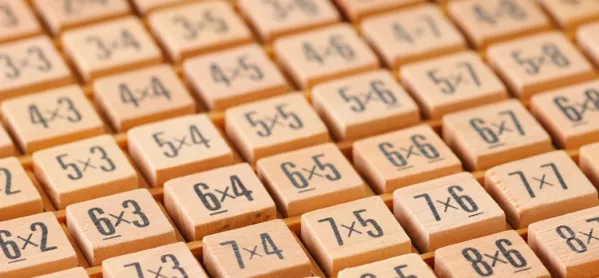Last month, schools minister Nick Gibb confirmed that the government plans to make 11-year-olds undertake a times tables check from 2019 onwards. Ordinarily, I’m less concerned than most about testing ─ although I have grave reservations about such data being used in league tables. When I was a Year 6 teacher, I actually found that getting the class to complete an old Sats paper would support my planning for the following term.
However, I believe this new proposal is at best misguided and, at worst, detrimental to pupils’ mathematics.
1. ‘Maths anxiety’
We’ll start with the “maths anxiety” that rapid-fire tests cause. Sweaty palms, shaking, tears - all caused by fear. If a short period of time is given to answer questions, this can lead to disengagement amongst those who struggle to recall information quickly, and the higher stakes of this new test will only accentuate this further.
This emphasis on speed is peculiar to maths. Imagine a scenario where a child, perhaps less confident in art, completes a drawing. Their teacher’s feedback is that they must “do it quicker next time”. Similarly, when assessing children’s writing, would a teacher judge them on how quickly they could recall alternative adjectives for “big”? How long did Shakespeare take to write his plays? Does anyone care? Given such unnecessary time pressure, it’s no coincidence that maths is viewed so unfavourably.
2. ‘The times tables check mindest’
Interestingly, research indicates that children who are regularly tested on mental maths in this way are less likely to persevere when working things out mentally. This is because they have developed a mindset that if it can‘t be done quickly, then it can’t be done. So, the existence of rapid-fire tests can actually be detrimental to the very thing that they are trying to support.
I would argue that practising times tables in a rote fashion does not aid a deep understanding of multiplication. I’ve lost count of the number of children who can recall what seven times five is, but can’t tell me what five times seven is because “we haven’t got to the sevens yet”, and I’ve now given up asking what the inverse division fact is. It will be interesting to see to what extent the new test incorporates division, if it does at all.
3. Why times tables and not the other three operations?
What is so special about times tables that makes them of greater significance than the other three operations anyway? This is something that has puzzled me ever since I was a pupil. I’m often told by friends and colleagues that they can help at the shops. However, I’m sceptical at best. Take six times eight, for example. When and why would one purchase 48 of an item? Of course, it could be six items priced at 8p each, but then what items are priced at 8p?
Of much greater benefit would be the teaching and learning of skills that we use regularly in real-life situations, such as doubling, halving, percentages and - most crucially, in my view - estimation. It takes a unique person to add up every item in their trolley exactly to the penny, but we all develop a notion of what our bill might come to via our ability to estimate. It is essential, therefore, that we nurture this skill in children - but please, give them more than a few seconds to work it out.
David Boorman is senior lecturer in primary education (mathematics) at Edge Hill University
Want to keep up with the latest education news and opinion? Follow TES on Twitter and like TES on Facebook


